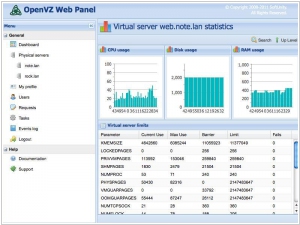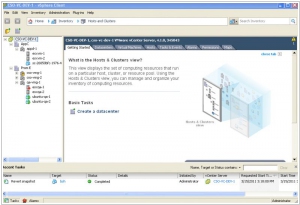OpenVZ vs VMware vSphere
May 28, 2023 | Author: Michael Stromann
6

OpenVZ is container-based virtualization for Linux. OpenVZ creates multiple secure, isolated Linux containers (otherwise known as VEs or VPSs) on a single physical server enabling better server utilization and ensuring that applications do not conflict. Each container performs and executes exactly like a stand-alone server; a container can be rebooted independently and have root access, users, IP addresses, memory, processes, files, applications, system libraries and configuration files.
16

Build your own cloud infrastructure in your datacenter and remote sites on VMware vSphere the world’s leading server virtualization platform. Virtualize your x86 server resources and aggregate them into logical pools for allocation of multiple workloads. Get network services optimized for the virtual environment, along with simplified administration and management. Reduce the complexity of back-end storage systems and enable the most efficient storage utilization in cloud infrastructures.
OpenVZ and VMware vSphere are both virtualization technologies but with different approaches and target audiences.
OpenVZ is an operating system-level virtualization technology that enables multiple isolated Linux containers to run on a single physical host. It provides efficient resource utilization, lightweight virtualization, and easy management. OpenVZ is ideal for scenarios where you need to run multiple Linux-based containers with shared resources on a single server. It offers good performance and low overhead but is limited to running Linux-based containers and does not support other operating systems.
VMware vSphere, on the other hand, is a comprehensive virtualization and cloud computing platform that provides full virtualization capabilities, including hardware-level virtualization, for running various operating systems. vSphere uses VMware's ESXi hypervisor, which allows you to create and manage virtual machines (VMs) on a host server. It offers advanced features like live migration (vMotion), high availability (HA), distributed resource management (DRS), and centralized management through vCenter Server. vSphere is suitable for enterprises and businesses that require a robust and scalable virtualization platform supporting multiple operating systems.
See also: Top 10 Virtualization platforms
OpenVZ is an operating system-level virtualization technology that enables multiple isolated Linux containers to run on a single physical host. It provides efficient resource utilization, lightweight virtualization, and easy management. OpenVZ is ideal for scenarios where you need to run multiple Linux-based containers with shared resources on a single server. It offers good performance and low overhead but is limited to running Linux-based containers and does not support other operating systems.
VMware vSphere, on the other hand, is a comprehensive virtualization and cloud computing platform that provides full virtualization capabilities, including hardware-level virtualization, for running various operating systems. vSphere uses VMware's ESXi hypervisor, which allows you to create and manage virtual machines (VMs) on a host server. It offers advanced features like live migration (vMotion), high availability (HA), distributed resource management (DRS), and centralized management through vCenter Server. vSphere is suitable for enterprises and businesses that require a robust and scalable virtualization platform supporting multiple operating systems.
See also: Top 10 Virtualization platforms



